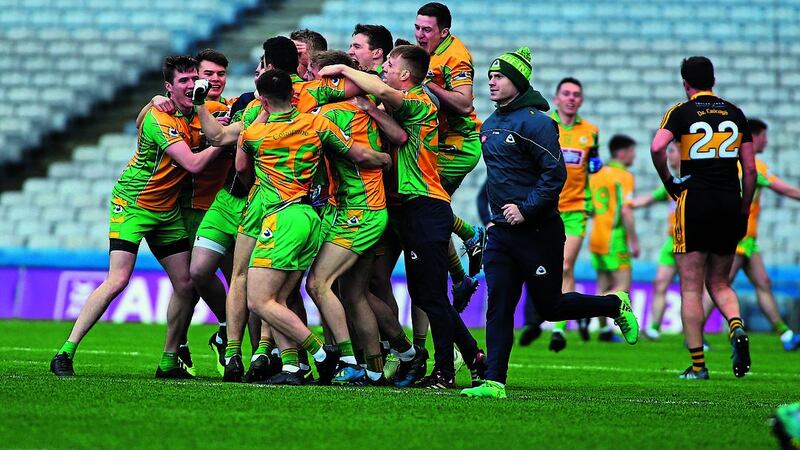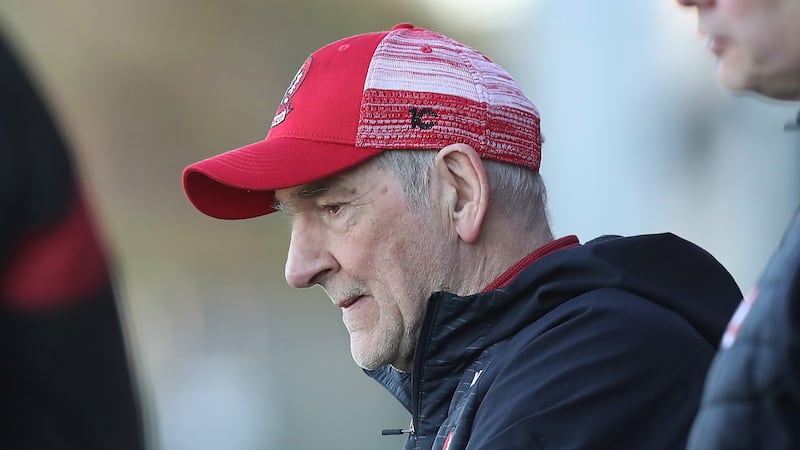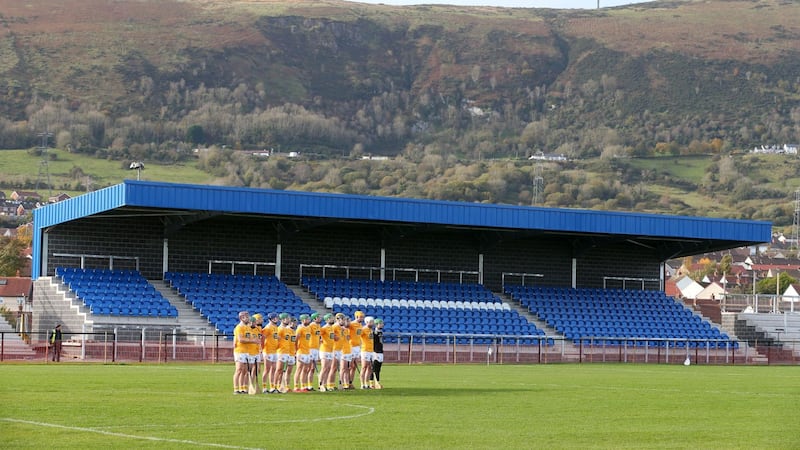IN the imitative realm of Gaelic football, there is no secret recipe.
Teams that find their own way up the steps of the Hogan Stand have all taken someone else’s template and added their own twist. Even the best of them.
Corofin have been winning All-Irelands by kicking the ball. There could not be an idea less secret than one that incorporates the name of the sport itself.
Yet it’s much too simplistic to think that’s all it is.
Over the last five years, the north Galway club has morphed from being the dominant force in their own county to toying with the rest of the country.
Other teams kick the ball, but only Corofin’s forwards have been like marionettes dancing on top of the Croke Park sod, flashing from one side to the other and tearing holes in places where the opposition thought their stitching was tight.
There was never an All-Ireland that happened by accident, but their excellence is owed to all manner of factors.
Their proximity to Galway city, and yet their distance from it, could not be more perfect. Work and university are 20 minutes away. Home is still rural but it expands as the city reverberates.
Like any successful team, there has been good planning and good fortune. They haven’t lost a significant player to travel or defection since Ronan Steede and Michael Farragher returned from Australia in 2012.
Their first Andy Merrigan Cup winning team in 1998 was blessed by the legendary Jimmy Duggan’s sister Geraldine marrying Donegal native Paul McGettigan, who became player, coach and then All-Ireland winning manager once he bought into his new club.
So many of the current team are sons or nephews of former past players, so it’s in blood and breed. This team lives the lifestyle of inter-county players.
These are all parts of the puzzle that has brought them to an altar that no club has reached. Even the great Crossmaglen teams never won three-in-a-row, as Corofin will attempt to do on Sunday.
It began 35 years ago with Frank Morris. In him, they had an architect with vision.
A retired teacher, Frank’s steeped in Corofin. His father played, he played himself, as he did a small bit for Galway, and his son David now coaches the senior side.
The parishes of Corofin and Belclare, where their training centre is located, are small but rich in GAA heritage.
That didn’t always translate to success. Prior to 1991, they’d only ever won three senior county titles. The gaps between 1932, 1946, 1977 and 1991 were indicative of their ability to rise and their propensity to fall.
In the mid-80s, Frank Morris single-handedly pulled together an idea to structure and streamline underage coaching the club for the first time.
And not only did he have a structure, but he had a plan that he dogmatically believes in to this day.
“Frank’s idea was give guys the basic skills and let them develop from there. There is particular emphasis on kicking the ball,” says his fellow coaching officer, Aidan Donnellan.
They are what they repeatedly do, as the saying goes.
On Saturday mornings, all the footballers from knee-high to 12 years of age come out to Belclare. Where they once would have had one team at each age group, they’re now fielding three.
The facilities around them have been developed over time, their coaching now has a wider base, but the same basic principles that were first rewarded in ’91 and then with eight consecutive county minor titles from ‘92 onwards remain.
“One of the key things, again from Frank’s coaching, is games with no soloing whatsoever,” says Donnellan.
“No hop, no solo, no handpass. Kicking only.
“Kick it out, kick, kick, kick it over the bar. And use both feet.”
Those games happen in every single training session at underage level.
The idea of producing two-footed players is again something they wouldn’t lay claim to the trademark on.
The difference between Corofin and other clubs is their persistence and their lack of tokenism.
Where others will ask young players to dip on to their weaker side for a few minutes before tidying the session up again, the reigning All-Ireland champions don’t stop until the bad foot catches up.
Donnellan himself, who captained Galway minors in 1994 and was a key player when Corofin in 1998 won their first All-Ireland, was a wholly right-footed player when Morris coached his U14 team to a league title in 1989.
“I would never have kicked the ball with my left foot. But you were given a football by Frank and he said ‘left foot, and you don’t kick it with your right again for the next few months’.
“He coaches the game that whichever way you turn, that’s the way you use the ball. Lads are encouraged to use both their feet.”
That remains the template to this day, and he is “dogmatic” in his and the club’s protection of it, no matter which way the wind blows football tactically.
The aim is that every player is as comfortable off one side as the other by the time they finish U14 football.
“As Frank says himself, the secret is that there’s no secret,” says Donnellan.
“We’re maybe just not looking at a 10-year-old thinking he’s a great footballer.
“Rather than this idea of a big, strong fella dominating a match, soloing up and down the pitch and everyone says to Paddy ‘you’re great’, you’re looking to develop the skill of being bilateral.
“We’re thinking how we can develop them to be a good senior, what will you need down the road?”
Others have tried, and will try harder, to imitate. The benchmark that Corofin are setting has been on full display at senior level over the last 30 years, but it’s crafted long before the players ever get near adulthood.
** ** ** ** ** ** ** ** ** ** ** ** ** ** ** **
COROFIN have held Galway football in a vice-grip pretty much ever since they won the county title in 1991. Since then, they have won 18 senior championships, including the last seven and all but three since 2006.
Ironically, it is there that they’ve found themselves most vulnerable over the last two years. They needed a replay to get past Mountbellew/Moylough (managed by one of their own, Aidan Donnellan’s brother Michael) in last year’s county final, and then the same again to get over Tuam Stars this year.
That’s the chance they take by easing up after each All-Ireland final and only really starting to motor again in September time, so as to keep the freshness about themselves for the journey that has become their staple diet.
While Tuam Stars were the last team to beat them domestically in the 2012 semi-final, Salthill/Knocknacarra came behind them and won the final that year. They’ve both endured nothing but pain at Corofin’s hand since.
Former Galway defender Finian Hanley is edging towards the tail end of his career with Salthill now. The city giants have lost two finals in recent years, and he was in the number six jersey when the champions got the better of them again in this season’s semi-final.
While so much of what Corofin have built has been done on Saturday mornings in Belclare, for Hanley there are very different and equally telling markers of how and why they’ve built upon it at senior level.
“I think they’re so advanced in their training methods that their plays, their set-plays from sideline balls, or when Ronan Steede has the ball, who vacates the ‘D’, where the space is left, why it’s left – it’s the Dublin model.
“For want of a better phrase, they’re more educated in the game than most clubs in terms of the stuff that’s done without the ball.
“They’ve it down to a fine art. Their movement all over the park, how they create space to make sure the best person gets the ball. They’ve bought into it and it’s a very difficult model to break down.”
Hanley also believes that on top of an ability to transition minors through the drop-off period between 18 and 21, their players have a genuinely selfless approach that other clubs struggle to match.
“In most clubs, the best case scenario is having one or two that will go off and do their own thing, whether it’s having pot-shots or not turning up to training. These guys are just so focussed on what they do.
“Ian Burke is Galway’s only Allstar in the last 20 years, a phenomenal player – he spent the whole first-half last week running out of the way to create space for other guys. They’re very unique.”
Corofin are unbeaten in 44 games across seven years in the Galway championship. But so much of their dominance started with a run of eight consecutive minor championships between 1992 and 1999, as well as two All-Ireland Féile na nÓg titles in 1995 and 2004.
Kieran Fitzgerald came off the first team, while the likes of Michael Farragher, Michéal Lundy and an 11-year-old Daithi Burke came off the second.
In between, they won their first All-Ireland senior club title in 1998. It laid down a marker not just for Corofin, but for Galway and Connacht football.
The Andy Merrigan Cup had never travelled west before that. Six months later, Galway were All-Ireland champions for the first time since 1966.
Half of that Corofin team were either under-21 or just out of the grade, yet despite finding their way out of Galway time and again, it would be another decade before they would win back the Connacht title.
“Absolutely,” says Aidan Donnellan whether there’s almost a sense of underachievement in the period in between.
“It’s a funny one as to why it didn’t happen,” recalls Aidan Donnellan.
“Other teams emerged in the province. You had an excellent Crossmolina team, they were a super side, they had three years out of four winning Connacht.
“Some of our lads moved away, two key lads – Jason Killeen and Kevin Newell, they went away for work in 2000.
“This particular team, there’s a different formula. What they have that the previous team kind of didn’t is a cohort of free-scoring forwards.
“While we won some county and Connacht championships, we never could push on to national level because we were just a bit lacking. We had good forwards, but not of the calibre these guys are.”
** ** ** ** ** ** ** ** ** ** ** ** ** ** ** **
THERE was 17 years between the club’s first All-Ireland and its second in 2015, when they beat Mickey Moran’s Slaughtneil in the final.
In late 2012, Stephen Rochford had applied, unsuccessfully, for the Mayo U21 job and had no real interest in a club job until Corofin came knocking.
He’d won an All-Ireland club as a player with Crossmolina, and having moved to south Mayo, he was just 25 minutes away.
He knew what they were about, but altering their style into one that utilised the new breed of forwards he had coming through was one of the major priorities when he took over.
“That was probably something they had self-identified,” says Rochford.
“If you were to very simply identify, how many of their inter-county players in the past typically played defensively rather than offensively, you could probably list six or seven guys that played goalkeeper up to midfield, but apart from Gary Sice, they didn’t necessarily have that in attacking positions.”
It didn’t happen overnight, with his first year ended in a Connacht semi-final defeat by Castlebar.
Rochford admits he probably had, in his own words, “more poetic licence” than previous in-house managers to try things like giving intelligent half-back Gary Delaney a free role in attack.
It took a while to click, but when it did, they were unstoppable.
Just this week, Kieran Fitzgerald was speaking of the significance of their 2015 All-Ireland semi-final win over St Vincent’s and drawing the inevitable comparison with Kilcoo’s recent victory over Ballyboden.
Corofin overwhelmed everyone in their path to win the All-Ireland title, though they were halted by Castlebar the following winter, after which Rochford took the Mayo gig.
Now coaching with Declan Bonner in Donegal, he journeyed down to Ennis to see them in the flesh against Nemo Rangers two weeks ago, watching as the Cork champions’ spirit was crushed in a different, but no less emphatic, manner than two years previous in Croke Park.
“One of the things that stood out to me, I thought they were physically in really, really good shape,” he says.
“Maybe not all the beauties of the game, but their tackling, their physical element, they really dictated the terms.
“Whilst that’s not always pretty to talk about, when people want to talk about their kick-passing and scoring, it has without doubt become one of their strengths also.
“Look back at their last two All-Ireland finals, the way they’ve physically dominated all over the field.”
And yet back to the Saturdays in Belclare, and Aidan Donnellan insists that while the club’s strength and conditioning coach, native former Galway player Michael Comer, has done a superb job, it remains very much an add-on with underage.
“Our policy is very straightforward – you wouldn’t have young guys lifting weights or anything like that,” says Donnellan.
“A lot of it is done on the field, integrated into warm-ups and things like that. It is an add-on.
“We’re aware of their need to develop into athletes, but the emphasis is still on developing the skills and playing the game.”
Rochford namechecks Mike Comer, Dave Comer, Terry Paine and Joe Canney as he speaks of the “grey matter” in the coaching setup behind Kevin O’Brien at the head and David Morris.
Hanley, who was taught in St Enda’s school by Frank Morris, seconds that.
“At that time [when Rochford took over] was when they changed from the old Corofin, who had really good footballers but maybe weren’t as clued into the modern stuff.
“Obviously Kevin O’Brien is the manager now and he facilitates the overall brilliantly.
“Dave Morris has been the common denominator across all their All-Ireland wins.
“He studies the game and studies other sports, and sees how people can be added to different systems and where they’re best suited, and really how to win. They know how to win.
“Sometimes they have everyone behind the ball, other times they push up, vacating the space in the ‘D’ – I think he’s had a massive input into how they play the game over the last number of years.
“It’s a mixture of developing skills, and him developing their systems.”
For Rochford, watching them in person again as they beat Nemo highlighted that the focus is not All-Irelands and it’s not even perfection.
“My sense when I was there, and even taking in the last game, is that I don’t think there’s an expectation of perfection in that group. They understand that people are going to make mistakes.
“People are encouraged to do the right thing, knowing that it won’t always come off, but don’t be strangled by the potential of an error.
“I think they’ll be no ways happy with their shot execution the last day, but they kept taking the shot. And you’ll see them on Sunday, they’ll continue to be encouraged to do that, and they’ll have learned.
“It won’t be a case where someone is told ‘you don’t shoot the next day’. People will be encouraged to do the right thing. That might sound very obvious, but it’s about seeking excellence more than perfection. Because nobody’s perfect.”
Corofin do the basics the same as everyone else. They just do them better.
‘The secret is there is no secret’.


